Maria Wiik
Maria Katarina Wiik (3 August 1853 – 19 June 1928) was a Finnish painter. She worked principally with still life, genre images, landscape paintings and portraits.[1]
Maria Wiik | |
|---|---|
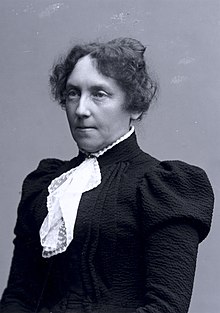 | |
| Born | 3 August 1853 |
| Died | 2 June 1928 (aged 74) |
| Nationality | Finnish |
| Education | Svenska fruntimmersskolan i Helsingfors Académie Julian |
| Known for | Painting |
Biography
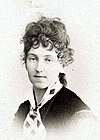
Wiik was born in Helsinki. She was the daughter of architect Erik Johan Wik (1804–1876) and his wife Gustava Fredrika Meyer. She was born and grew up in Brunnsparken and attended the Swedish language school Svenska fruntimmersskolan in Helsingfors. She then studied drawing with art professor Adolf von Becker.[2][3]
Encouraged by her family, she studied art during 1874–1875 at the Academy of Fine Arts in Helsinki. In 1875, she continued her art studies in Paris under Tony Robert-Fleury at the Académie Julian, one of the few private schools accepting women at the time.[1]
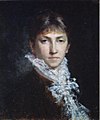
From 1875 and in 1880 she became a substitute teacher at the Academy of Fine Arts of Helsinki. Her early paintings accepted for the Paris Salon in 1880 were portraits. In 1881, she painted a series of small paintings with a more psychological atmosphere including minute details. In spring 1889, she returned to Paris with her friend, the painter Helene Schjerfbeck to work among others with Puvis de Chavannes.[4] In 1883–1884, they painted in England and then in 1889 at St Ives in Cornwall.[5]
Her painting Out into the World won a bronze medal at the Exposition Universelle (1900) and was included in the 1905 book Women Painters of the World by Walter Shaw Sparrow.[6]
Her last trip to Paris took place in 1905. The rest of her life she spent in Helsinki. Her vision deteriorated, and in 1925 she underwent an eye surgery. Wiik died in Helsinki in 1928.[1]
Works
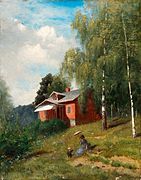 Summer Idyll, 1875
Summer Idyll, 1875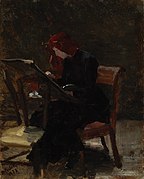 La Polonaise, 1878
La Polonaise, 1878.jpg) Portrait of Hilda Wiik, 1880
Portrait of Hilda Wiik, 1880.jpg) Portrait of Hilda Wiik, 1881
Portrait of Hilda Wiik, 1881 An Unlikely Duo, 1882
An Unlikely Duo, 1882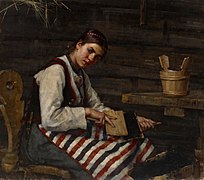 Girl Carding, 1883
Girl Carding, 1883 In the Summer Heat, 1883
In the Summer Heat, 1883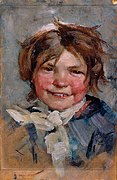 Laughing Girl, 1883
Laughing Girl, 1883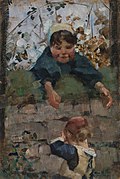 Farewell, Study for The Obstacle, 1883
Farewell, Study for The Obstacle, 1883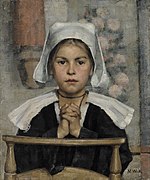 In the Church, 1884
In the Church, 1884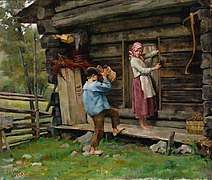 From Häme, 1885
From Häme, 1885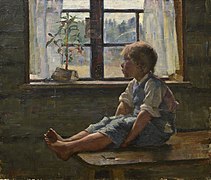 Alone at Home, 1885
Alone at Home, 1885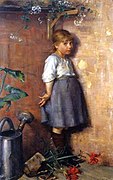 Bad Conscience, 1886
Bad Conscience, 1886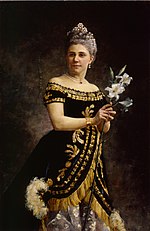 Ida Basilier-Magelssen's portrait, 1887
Ida Basilier-Magelssen's portrait, 1887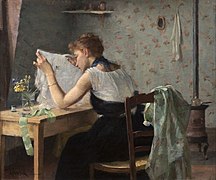 At the Attic Chamber, 1889, the artist’s sister Hilda Wiik at their apartment in Paris
At the Attic Chamber, 1889, the artist’s sister Hilda Wiik at their apartment in Paris-_Out_into_the_World_-_Maailmalle_(29614648576).jpg) Out into the World, 1889
Out into the World, 1889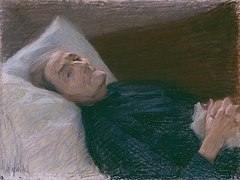 Old Woman in Her Sickbed, 1895–96
Old Woman in Her Sickbed, 1895–96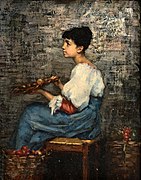 Fruit Seller, unknown date
Fruit Seller, unknown date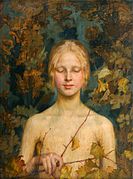 Innocentia, 1900
Innocentia, 1900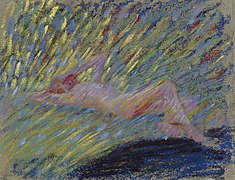 Naked Lying Female Model, 1904
Naked Lying Female Model, 1904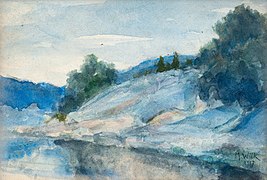 Landscape with Cliffs, 1917
Landscape with Cliffs, 1917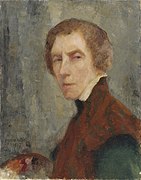 Self-Portrait, 1917
Self-Portrait, 1917
See also
References
- "Wiik, Maria (1853 - 1928)". kansallisbiografia. Retrieved January 1, 2019.
- "Wik, Erik Johan (Jean)". uppslagsverket. Retrieved January 1, 2019.
- "Adolf von Becker". lahteilla. Retrieved January 1, 2019.
- "Pierre Puvis de Chavannes (1824-98)". artchive.com. Retrieved January 1, 2019.
- "Schjerfbeck, Helene (1862 - 1946)". kansallisbiografia. Retrieved January 1, 2019.
- Women painters of the world, from the time of Caterina Vigri, 1413-1463, to Rosa Bonheur and the present day, by Walter Shaw Sparrow, The Art and Life Library, Hodder & Stoughton, 27 Paternoster Row, London, 1905
External links
- Maria Wiik at the Académie Julian website
- Maria Wiik on artnet
| Wikimedia Commons has media related to Maria Wiik. |